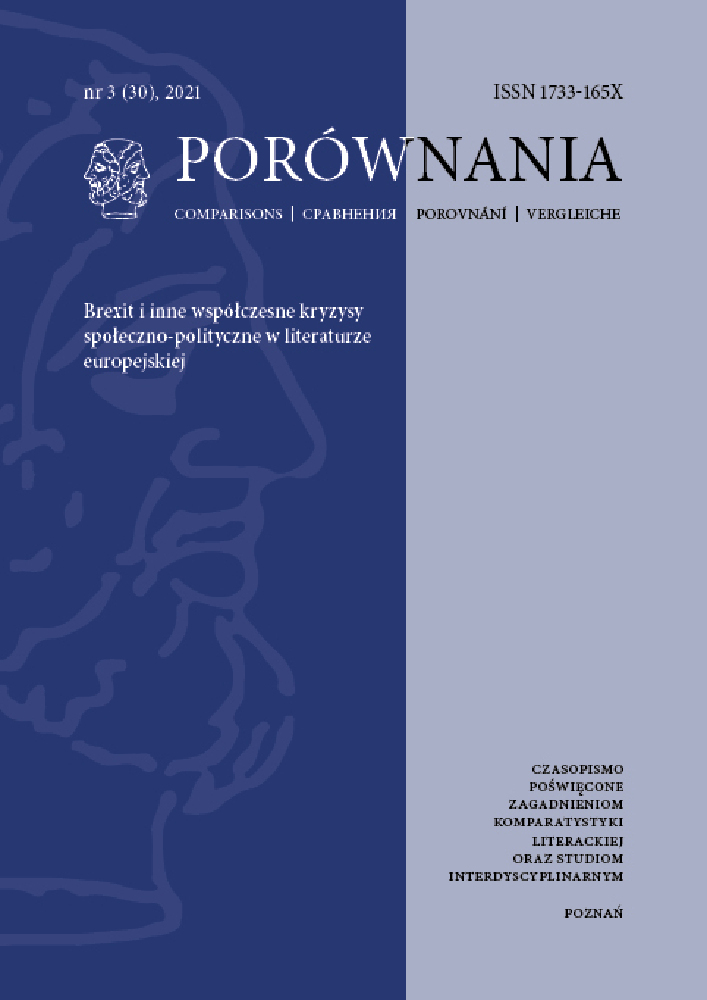Abstrakt
Ali Smith’s seasonal quartet—Autumn, Winter, Spring, Summer—was written and published at lightning speed, between the 2016 Brexit referendum and Britain’s effective departure from the EU in 2020. The article examines how the novels engage with the issue of Brexit, as they become the chronicle of a grinding cultural process and critically confront the transformation of the British nation. I survey various psychological factors related to the polarisation of the British nation and investigate Smith’s presentation of the way in which the populist propaganda of menace produced by the right-wing media leads to marginalising Otherness. Employing the nomadic theory of the subject developed by Rosi Braidotti, I analyse Smith’s literary strategies used to represent not only post-truth manipulation and institutionalised British xenophobia, but also the actions of people who resist them.
Reference
Bhabha, Homi K. The Location of Culture. London: Routledge, 2007.
Braidotti, Rosi. Nomadic Theory: The Portable Rosi Braidotti. New York: Columbia UP, 2011.
Braidotti, Rosi. The Posthuman. London: Polity, 2013.
Braidotti, Rosi. “Don’t agonise, organise!” Il Manifesto: Global Edition. 14 November 2016. https://global.ilmanifesto.it/dont-agonise-organise/. Accessed 20 April 2021.
Evans, Geoffrey, and Anand Menon. Brexit and British Politics. Cambridge: Polity, 2017.
Flood, Alison. “‘Post-truth’ named word of the year by Oxford Dictionaries.” The Guardian. 15 November 2016, https://tinyurl.com/h3yjdrea. Accessed 20 April 2021.
Gilroy, Paul. After Empire: Melancholia or Convivial Culture? Abington: Routledge, 2004.
Hughes, Brian M. The Psychology of Brexit: From Psychodrama to Behavioural Science. Basingstoke: Palgrave Macmillan, 2019.
Ley, James. “Brexit, Pursued by a Bard.” Sydney Review of Books. 4 December 2020, https://tinyurl.com/scm9tsmb. Accessed 20 April 2021.
Masterson, John. “’Don’t tell me this isn’t relevant all over again in its brand new same old way’: imagination, agitation, and raging against the machine in Ali Smith’s Spring.” Safundi 21.3 (2020): 355–372. https://doi.org/10.1080/17533171.2020.1776961.
Mbembe, Achille. Necropolitics. Trans. Steven Corcoran. Durham: Duke UP, 2019.
Norris, Pippa, and Ronald Inglehart. Cultural Backlash: Trump, Brexit, and Authoritarian Populism. Cambridge: Cambridge UP, 2019.
O’Rourke, Kevin. A Short History of Brexit: From Brentry to Backstop. London: Pelican, 2019.
Orwell, George. Nineteen Eighty-Four. London: Penguin 2013.
O’Toole, Fintan. Heroic Failure: Brexit and the Politics of Pain. New York: Apollo, 2019. E-book.
Rau, Petra. “Autumn After the Referendum.” Brexit and Literature: Critical and Cultural Responses. Ed. Robert Eaglestone. New York: Routledge, 2018. 31–43.
“Refugee Tales.” Literature Cambridge. https://www.literaturecambridge.co.uk/refugee. Accessed 20 April 2021.
Saunders, Robert. “Brexit and Empire: ‘Global Britain’ and the Myth of Imperial Nostalgia.” The Journal of Imperial and Commonwealth History 48:6 (2020): 1140–1174. https://doi.org/10.1080/03086534.2020.1848403
Shaw, Kristian. “BrexLit.” Brexit and Literature: Critical and Cultural Responses. Ed. Robert Eaglestone. New York: Routledge, 2018. 15–30.
Smith, Ali. Autumn. London: Hamish Hamilton, 2016.
Smith, Ali. Winter. London: Hamish Hamilton, 2017.
Smith, Ali. Spring. London: Hamish Hamilton, 2019.
Smith, Ali. Summer. London: Hamish Hamilton, 2020.
Smith, Zadie. “Fences: A Brexit Diary.” Feel Free: Essays. London: Penguin, 2019. 20–34.
Licence
Utwory opublikowane w czasopiśmie „Porównania”, na platformie Pressto należącej do Uniwersytetu im. Adama Mickiewicza w Poznaniu są udostępniane na licencji Creative Commons Uznanie autorstwa - Bez utworów zależnych 4.0 Międzynarodowe (CC BY-ND 4.0)
Tym samym wszyscy zainteresowani są uprawnieni do korzystania z utworów opublikowanych pod następującymi warunkami:
-
uznania autorstwa — czyli obowiązek podania wraz z rozpowszechnianym utworem informacji o autorstwie, tytule, źródle (odnośniki do oryginalnego utworu, doi) oraz samej licencji
-
bez utworów zależnych — remiksując, przetwarzając lub tworząc na podstawie utworu, nie wolno rozpowszechniać zmodyfikowanych treści.
-
brak dodatkowych ograniczeń — nie można korzystać ze środków prawnych lub technologicznych, które ograniczają innych w korzystaniu z utworu na warunkach określonych w licencji.
Uniwersytet im. Adama Mickiewicza w Poznaniu zachowuje prawo do czasopisma jako całości (układ, forma graficzna, tytuł, projekt okładki, logo itp.).
Autor zachowuje prawa majątkowe, ale udziela zgody Uniwersytetowi im. Adama Mickiewicza w Poznaniu na wykorzystanie dzieła. Autorzy tekstów zakwalifikowanych do publikacji proszeni są o wypełnienie podpisanie i przesłanie umowa (PL) agreement (EN)
Agreement for granting a royalty-free license to works with a commitment to grant a CC sub-license





